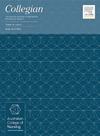Nurse practitioners in New Zealand: An integrative review of clinical practice and involvement in policy
IF 1.7
4区 医学
Q2 NURSING
引用次数: 0
Abstract
Background
Nurse Practitioner roles have escalated internationally with the aim of improving access to healthcare and thereby enhancing health and social outcomes. In Aotearoa New Zealand, Nurse Practitioner registration began in 2001, yet questions remain about their contributions to practice and policy.
Aim
To critically appraise peer-reviewed research on nurse practitioners’ contributions to clinical practice and health policy in New Zealand.
Methods
This integrative review followed Whittemore and Knafl’s five-stage framework. A search was conducted across six databases between January 2001 and May 2025. Inclusion criteria required studies to report primary research or audits. The Mixed Methods Appraisal Tool assessed methodological quality. Data were extracted, summarised in tabular form, and synthesised narratively across key domains. Twenty-two studies were included: 8 qualitative, 11 quantitative, and 3 mixed methods.
Findings
Nurse practitioners deliver expert, culturally safe healthcare across diverse settings. They collaborate interprofessionally to deliver coordinated care, promote health, and provide clinical leadership that improves healthcare access and equity. Studies highlight the nurse practitioner role in supporting underserved communities through models responsive to Māori and Pacific populations. Policy engagement remains weak. Barriers include organisational constraints, limited early-career support, insufficient data on workforce, clinical activity, and patient outcomes, and a misalignment between nurse practitioner values and funding models.
Discussion
Strong evidence shows that nurse practitioners improve care across diverse settings. However, their involvement in policy development remains limited. Data gaps and structural barriers continue to constrain their impact. Strengthening practitioner leadership, research capacity, and policy engagement is essential to advance equity and drive health reform.
新西兰执业护士:临床实践和参与政策的综合回顾
背景:执业护士的角色在国际上已经升级,目的是改善获得医疗保健的机会,从而提高健康和社会成果。在新西兰的奥特罗阿,执业护士注册始于2001年,但他们对实践和政策的贡献仍然存在问题。目的批判性地评估同行评议的护士从业人员对新西兰临床实践和卫生政策的贡献。方法本综合综述遵循Whittemore和Knafl的五阶段框架。在2001年1月至2025年5月期间,对六个数据库进行了搜索。纳入标准要求研究报告主要研究或审计。混合方法评估工具评估方法学质量。数据被提取出来,以表格形式总结,并在关键领域以叙述的方式综合。共纳入22项研究:定性研究8项,定量研究11项,混合研究3项。护士从业人员在不同的环境中提供专业的、文化上安全的医疗保健。他们进行跨专业合作,提供协调一致的护理,促进健康,并提供临床领导,以改善医疗保健的可及性和公平性。研究强调了执业护士在通过响应Māori和太平洋人口的模式支持服务不足社区方面的作用。政策参与仍然薄弱。障碍包括组织约束、有限的早期职业支持、关于劳动力、临床活动和患者结果的数据不足,以及护士执业价值观和资助模式之间的不一致。强有力的证据表明,执业护士可以改善不同环境下的护理。然而,它们对政策制定的参与仍然有限。数据差距和结构性障碍继续限制其影响。加强从业者领导、研究能力和政策参与对于促进公平和推动卫生改革至关重要。
本文章由计算机程序翻译,如有差异,请以英文原文为准。
求助全文
约1分钟内获得全文
求助全文
来源期刊

Collegian
NURSING-
CiteScore
2.70
自引率
6.70%
发文量
127
审稿时长
72 days
期刊介绍:
Collegian: The Australian Journal of Nursing Practice, Scholarship and Research is the official journal of Australian College of Nursing (ACN).
The journal aims to reflect the broad interests of nurses and the nursing profession, and to challenge nurses on emerging areas of interest. It publishes research articles and scholarly discussion of nursing practice, policy and professional issues.
Papers published in the journal are peer reviewed by a double blind process using reviewers who meet high standards of academic and clinical expertise. Invited papers that contribute to nursing knowledge and debate are published at the discretion of the Editor.
The journal, online only from 2016, is available to members of ACN and also by separate subscription.
ACN believes that each and every nurse in Australia should have the opportunity to grow their career through quality education, and further our profession through representation. ACN is the voice of influence, providing the nursing expertise and experience required when government and key stakeholders are deciding the future of health.
 求助内容:
求助内容: 应助结果提醒方式:
应助结果提醒方式:


